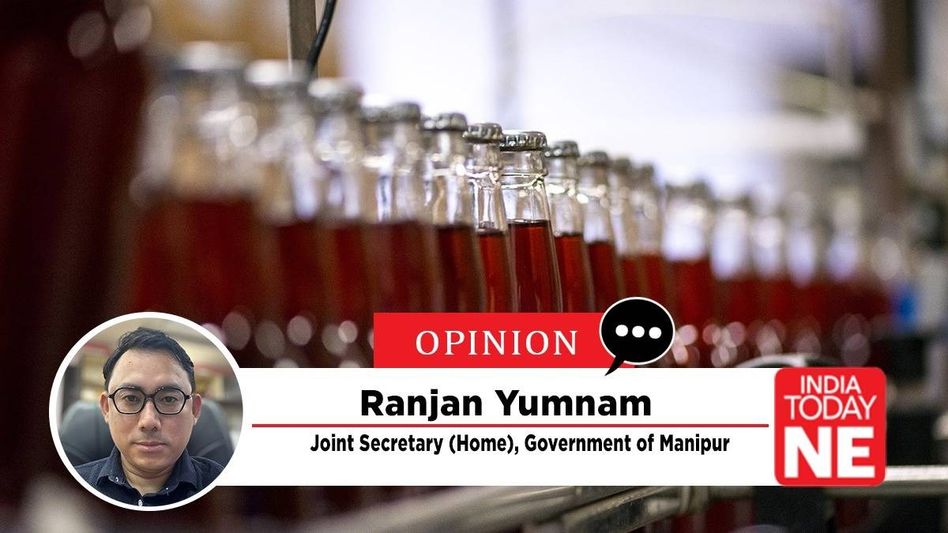We Men, Wine & Prohibition
During much of history, beer was considered more nourishing and healthier than water as the natural water found in the wilderness was filled with germs that could cause diseases and kill the persons who drank it because they were none the wiser.
 We Men, Wine & Prohibition
We Men, Wine & ProhibitionCare to play with a thought experiment? If you are asked to choose one candidate to be the Prime Minister of a newly founded country and your vote decides the results of the election, which one among the following three candidates will you choose? Candidate 1: He is partially paralyzed from polio. He has hypertension. He's anaemic and suffers from an array of serious illnesses. He lies if it suits his purpose and consults astrologists on his politics. He cheats on his wife, chain-smokes, and drinks too many martinis. Candidate No. 2: He's overweight, and he's already lost three elections. He suffers from depression and has had two heart attacks. He's impossible to work with and smokes cigars non-stop. And every night when he goes to bed, he drinks incredible amounts of champagne, cognac, port, whiskey, and adds two sleeping pills before dozing off. The last one, Candidate No. 3: He's a highly decorated war hero. He treats women with respect. He loves animals, never smokes, and only has a beer on rare occasions. This question of choice is a no-brainer; most of us will choose Candidate No.3. But what you do not know is that the first candidate best describes Franklin D. Roosevelt, the second Winston L. Churchill, and the last, and the one you might have chosen, is Hitler.
I didn’t make up this thought experiment; it is inspired by a scene in Another Round, an Oscar-winning movie. The movie is based on the premise of one psychologist, Finn Skarderud, who hypothesised that human beings are born with a deficit of 0.05% alcohol in their bloodstream, its shortage limiting optimal cognitive functioning and dampening mood. The theory is that because our ancestors were alcohol-guzzling creatures, we are born with a genetic memory of intoxication, and therefore, we seek it by default. The human body is designed to drink. The generous and forgiving liver corroborates this theory when it prioritizes its engine for processing alcohol while shutting down all metabolism for other less important food. “Beer if I have it or water if I have no beer,” young people used to say in the Middle Ages when asked about their dietary habits.
Alcohol, the lifegiver
During much of history, beer was considered more nourishing and healthier than water as the natural water found in the wilderness was filled with germs that could cause diseases and kill the persons who drank it because they were none the wiser. Beer was the life giver and the protector of health, endowed with calories, carbs, energy and mood enhancers. The history of mankind is intertwined with the discovery of fermentation, distillation, and bottling of alcoholic beverages in attractive vessels, the human imagination falsely imbuing it with character, status and morality later.
Before Charles Darwin wrote ‘The Origin of Species’ and showed how the environment shaped and literally designed the human anatomy to adapt for survival in the changing ecosystem, it was the monkeys, perhaps, who discovered alcohol and went crazy about it. Darwin also drank brandy during his time of exploration of nature to distil the evolution code. Had he lived longer, he would have been amused by the Drunken Monkey Hypothesis of the discovery of one of the most valuable liquids after fossil fuel. Robert Dudley, a biologist at UC Berkeley, posited the Drunken Monkey hypothesis, which credited the monkeys with accidentally imbibing alcohol while they ate rotten and sugary fruits laced with alcohol due to natural fermentation. The decomposed fruits attracted the monkeys with the alcoholic smell. Since then, mother evolution has been finetuning the bodily functions of the human species and their ancestors to optimise alcohol intake, culminating in the wonderful development and endurance of the human liver to the point of Cirrhosis.
The monkey story is just the tip of the wine cork. Scientists believe that the first organic life on Earth resulted from a chemical reaction involving ethanol, the scientific name for alcohol, and other inorganic molecules. The primordial broth that created the first unicellular life was basically an alcoholic soup that provided nutrition and a warm and cosy natural sac for life to grow and intermingle with other semi-life forms. The rest is history.
Drunk History
Once our ancestors appeared on earth, alcohol followed them like their shadows. From prehistoric times to the present day, alcohol has captured the mouths, brains and mindsets of our wives and husbands. The earliest homo sapiens, for example, were gregarious types who knew how to brew beer and have nice times after their tedious hunting work was over by the end of the day. One of the earliest archaeological pieces of evidence of drinking beer is the Venus of Laussel, a limestone figurine excavated in 1911 in an eponymous cave in France. Painted in red ochre, the figurine depicts a nude female holding a horn of beer to her mouth.
At the dawn of civilizations, the Sumerians, the Egyptians, the Indus Valley Proto Indians, the Mesopotamians, and the Chinese fermented fruits, barley, honey and whatever sugary jackfruits they could find to produce beer and used them for rituals, tantric gatherings and celebrations. After techniques of fermentation were first learnt by the Chinese in 7000 B.C., beer-making leapt to winemaking in Mesopotamia, where grape vines were cultivated for the purpose in 6000 BC. Later, we come across Sura, the Indian drink made from rice around 3000 BC. Another Indian mystic drink, Soma, was at the centre of Brave New World, a novel written by Thomas Huxley that an Orwellian government uses to impose conformity, flatten emotions, universalise human experience and ban mutual relationships in which sameness is celebrated and enforced by feeding the citizens the Soma pill in a stealth manner. The Greeks had Dionysus, a wine Goddess. Much like our Sekmai Chamelei, a muse for the Manipuris.
Alcohol was so vital that some scholars even believe that men started farming to sustain beer production without depending on the crumbs of nature for raw materials. It also became economically valuable and drove human motivation against all odds. To illustrate, history records that Pyramids were built by slaves who were paid in beers, the only explanation how the Pharaohs managed to persuade the slaves to perform the drudgery of lifting piles upon piles of rocks to impossible heights. Beer was an easy, quick and cost-effective food suitable for delivery to the workers at various worksites of the Pyramids. It doesn’t spoil easily and comes loaded with calories, energy and euphoria.
From beer, the next sip was wine. Wine has a finer ring to it and is popular among the elites of the Classical Civilisations. These civilisations took intoxication to new heights, and they categorised alcoholic beverages along social hierarchy, gender, and political glass. Things took another wild turn when the technique of distillation was invented by the Arabic Alchemists in the 8th A.D., which literally changed the flow of history. The earlier problems of the beer—its low alcoholic content, durability and volume—were improved dramatically by the inauguration of distillation. All the beloveds of men, like whisky, rum, gin, vodka, martini, etc, took the world by their charms. During the European Imperial Age, liquid charms were spirited to various colonies in the world, nooks and corners, and liquor became a wildly acceptable global product like KFC is to chicken nuggets in modern times.
Prohibition Pains
As wine and whiskey and their fluidic types became a part of the food chain and as they rapidly climbed the totem poles of many cultures, alcohol’s effects alarmed the religious and women groups. The drunkenness problems caused public health scares and raised morality & mortality concerns since 1600 AD in the Western world. The ill effects of alcohol in society, from crimes and sexual assaults to domestic violence, reached its high point during the 1920s in the United States of America. The temperance movements grew shrill, and the call for prohibition intensified in the USA, leading to the legislation of prohibition policy. In Eastern countries like India, the distrust of alcohol has always been palpable because of Hinduism. Mahatma Gandhi wrote that “drink is more a disease than a vice. I would hold drink to be more damnable than thieving and perhaps even prostitution.” The Chinese, too, believed that getting sloshed all day would disturb social harmony, and drinking was discouraged in favour of ritualistic ideals in Confucian society.
Closer home, in Manipur society, the Meira Paibis (women torch bearers) led the anti-alcohol movement, followed by dedicated NGOs that advocate for uprooting alcohol from the society in which it is normalised as part of religious, cultural, and lifestyle norms. This public outrage was vindicated when the State Government banned the sale, consumption, and distribution of alcoholic beverages in 1991 in Manipur, except for cultural preservation.
Zooming out from regional anti-alcohol movements, prohibition can be seen from the religious points of view. Most major religions besides Hinduism discourage or ban drinking outrightly without even a slur of a speech. Christianity does not specifically ban alcohol, but its theologians and priests interpret the sacred scriptures and privilege the view that drinking is a source of vices and moral degradation pushing men nearer to Satan. At this Christian injunction, the detractors always bring up the Jesus paradox. You might already know that according to the Old Testament, Jesus transmuted water into wine by miraculously refilling empty stone jars with 120 gallons of the finest wine for a wedding feast at Cana. Jesus and his disciples attended the wedding and proactively enjoyed the festivities in a tipsy-turvy way. Don't forget that the Last Supper is a testament to the virtues of wine for spiritual salvation.
On the other hand, Islamic laws tread a very strict line and make Christianity look like a wasted kid. Somewhat permissive in the beginning with a sombre edict to refrain from praying while drunk, Islam hardened its stance against drinking and eventually made it a fatwa for all intents and purposes to be obeyed by true Muslims. A passage from the Surah at 47:15 tells of the parable of Paradise in which the God-fearing Muslims have been promised: “In it shall be rivers of incorruptible water, rivers of milk unchanging in taste, and rivers of wine, a delight to those that drink; and rivers of pure honey. The wine is a sign of Satan in this life, but in the afterlife in heaven, you will enjoy rivers of wine.” This, nevertheless, confounds the teetotaller in us. Does it mean that abstention in this life will be rewarded in the afterlife with rivers of wine? To be fair and upfront, Islamic scholars have clarified that the wine in the parable is not wine. It is a metaphorical stand-in for a life of happiness, wholesome happiness and tranquillity.
For the Buddhists, alcohol is like a maya; it is almost non-existent. A Buddhist even denies the concept of self. If there is no self, who will drink the wine? The 5th precept of the Eightfold Path of Buddhism nevertheless prohibits intoxication through alcohol, drugs, or other means.
Last Days of Prohibition
But Prohibition is not as easy as it sounds. It had many unintended consequences. The prohibition in the US was not so sober and successful. It led to bootlegging, the rise of mafia cartels to hawk alcohol in the black market, and corrupt officials and police looking the other way while the quality and prices of the booze were left to their own devices. Ingenious and more efficient workarounds were the Speakeasies, which were like the illegal vendors or theka in the Indian street lingo, where people could have their alcoholic shots and leave the place quickly. These informal dispensers became so accessible and democratic that women also visited them for their share of euphoria.
To sum it up, prohibition fell flat on its sober face, at least in America! The decision to repeal prohibition in 1932 in the US was not driven by dilution of anti-booze attitudes alone; the Government was equally compelled by exigencies to fund the War Chest by imposing taxes on the alcohol business. Among the unintended upshots, one scientific fact that stood out from the prohibition days is that craving for alcoholic drinks is not an individual moral failure but a psychological illness. Going by this tip, Alcoholics Anonymous was founded in 1935, based on the key message that alcoholism is a bad Master beyond the power of human willpower, and the only means to quit it is to surrender oneself to a higher power, distancing oneself from the addiction one day at a time.
Bar Women and Patriarchy
Prohibition was a heady mixture of war politics, ecclesiastical disapproval and feminism. Because of feminist activism and women’s objection to drinking by men in the saloons offering unsavoury off-menu attractions, alcohol has been associated with debauchery, crimes and the flesh trade. Drinking has failed more or less to recover from that myth ever since.
Women had to bear the major brunt of the brew, and their relationships with alcoholic beverages were subjected to stereotypical judgement from the societies in the course of history. In egalitarian prehistoric times, women were appreciated for brewing beer while the men ventured away to chase the game. This arrangement served both genders well. While men exerted themselves physically in the wilderness, women imaginatively used their time and resources to craft something of value and provide nourishment for the whole tribe. The fair sex led in beer production and partake equally in the fruits of their labour with their male counterparts from the same barrel. But things suddenly went sour for women as saloons/pubs offering extra services had opened in villages and towns, and these centres became associated with drunkenness, sensual pleasure and debauchery, pouring cold water on the reputation of all women with a broad brush.
At the home front too, drunk men beat their wives after losing money at alcohol fuelled gambling saloons, and marriages failed like inebriated institutions. It is no wonder that beleaguered women led the backlash against alcohol culture in general and public taverns in the form of temperance movements. Saloons came to be discredited, and the negative taint against women who worked there became far more permanent. Respectable ladies stayed at home, took care of the children and loved their husbands only—so went the folk wisdom. The demonisation of women with wine at one point seemed absolute and complete.
“Patriarchal oppression and misogynistic societal expectations play the biggest roles in a culture’s drinking habits. The double standard that drinking women face is deeply rooted in male anxieties about control and their fear of women acting like people, not property,’ Mallory O’Meara writes in the book Girly Drinks: A World History of Women and Alcohol. “If you want to know how a society treats its women, all you have to do is look into the bottom of a glass,” she adds for a punchline.
I drink, therefore, I rum
People drink for many reasons. Horace, the famous Roman poet who gave us the memorable phrase carpe diem (seize the day) also had this to say about drinking: “Wine brings to light the hidden secrets of the soul, gives being to our hopes, bids the coward flight, drives dull care away, and teaches new means for the accomplishment of our wishes.” Scientists like Benjamin Franklin even hailed it to the point of divine intervention, claiming that “beer is the proof that God loves us and wants us to be happy.”
When it comes to drinking, the Romans were the ostentatious and stylish fellas. The Romans had a tradition of organising large drinking conventions in the Convivium in which they would drink until they vomited and try to procreate offspring with random women during the drunken free-for-all. Adjacent to the large Convivium, they had a Vomitorium, and if one were to loiter around the party revellers, she might overhear them asking directions with poker faces like: “Buddy, which way is Vomitorium? I want to throw up urgently?”
The scene was somewhat orderly in the Greek Symposiums where great philosophers and their students gathered and discussed metaphysical and epistemological subjects. A typical class in the Symposium would start with Socrates or any other famous thinker walking thoughtfully at which time wine must have already been served and partaken to turn the wheels of philosophical minds. Socrates didn’t drink much and Aristotle was all for moderation and striking a balance. Women and slaves were allowed to serve the intellectuals but ladies stayed at home.
Public places like saloons, bars, conviviums, symposiums, etc., serve a unique need for people--to be in a place which is neither workplace nor home, where you can somehow be yourself and let your hair down. A place which is the neutral ground, which sociologist Ray Oldenburg named the “third place” in his book, The Great Good Place. So, a pub is a place where you get away from the boss standing over your shoulders in the office or the spouse micro-tracking your facial muscles in the bedroom.
Why we drink?
Just like our social obligations and the friends that we encounter, drinks have become ubiquitous in all settings of our lives. Drinks are the chaperones of observation of major life transitions like the birth of a child, marriage, career advancement and death. Wine bottles are uncorked during birthdays, weddings, award ceremonies, break-ups, dates, funerals, in sorrow and happiness, and any other personal milestones. Sometimes, we drink for a simple reason: to reduce stress and escape boredom when we feel our friends and social media reels aren't enough to lift our mood. For the mentally ill, it is the last straw that is held to cope with trauma and depression. In many cases, the coping habit becomes an addiction as alcohol is used as self-medication.
Whatever the reasons for drinking, it is the philosophers who have a wild run expressing their opinions. Marx predictably said that religion is the opium of the masses and that alcohol is a conspiracy hatched by capitalists to derail the unity of the workers and keep them in the dark about the capitalist's real motive of profit-making and exploiting the working class. The irony is that workers are drinking away their woes and the rulers are drunk on power.
Aristotle was all for moderation in drinking wine which can be beneficial for social bonding and relaxation. The hedonistic spokesperson, Epicurus, echoed a similar line that the excess pleasure from drinking should be avoided as excessive consumption undermines rational living and happiness. Liberal John Stuart Mill invokes his harm rule, emphasising that individuals should be free to consume alcohol as long as they don't harm others, reflecting the importance of personal liberty. Louis Pasteur summed up for his pals: “A bottle of wine contains more philosophy than all the books in the world.”
Another round, one more
At the start of this essay, using a plot from the movie Another Round, our anti-alcohol bias was revealed in a thought experiment that involved selecting a Prime Minister for a fictitious country. When given the option of selecting one qualified person from a group consisting of two drunkards and one near teetotaller who also respects women, we supported the less drunk, and that person happened to be Hitler. Our prejudice against alcohol-drinking individuals runs high. Finn Skarderud’s theory of 0.05% alcohol deficit in human blood was subsequently rejected by the scientific community, and, in the movie, the protagonist’s social and professional life improved drastically in the initial stage, but he became addicted and lost his life to liquor at the end. The movie started as a paean to alcohol, but it turned out to be a cautionary tale of substance abuse.
The side effects of drinks are like a chameleon; you never know what effect it will have on different individuals. For example, the prevalence of obsessive drinking among creative artists and writers runs counter to the usual belief about the harm of alcohol to one’s mental faculties. Some of the biggest writers were drunkards or struggled with alcoholism. Mozart, Ernest Hemingway, Stephen King, Britney Spears, Johnny Depp, countless rock stars, Winston Churchill, etc., were drinking giants, and their names should be in the Hall of Fame of alcohol connoisseurs. Virginia Woolf was at her creative high when she compared beautiful words to wine on lips.
Donald Trump, in spite of his eccentric behaviour, is a teetotaller. So is President Joe Biden. Then we have Clinton, the icon of good times. Pushing the edges of nerves is the former Prime Minister of UK, Boris Johnson, who partied hard with all types of beer and spirits at his official residence while the UK was in lockdown during Covid-19 and the government was enforcing social distancing to prevent spread of the epidemic.
Is alcohol a scapegoat?
All this brouhaha over alcohol consumption may be a red herring. VCR makers often invoke the legal principle that a tool is not responsible for its misuse in activities such as illegal piracy. Using this analogy, it is not alcohol that leads to bar brawls, crimes, accidents, inappropriate behaviour and speech, but it is the responsibility of the drinkers to control themselves and know the limits. The Gun Lobby’s favourite argument is that it’s not the guns that kill people, but the individual that pulls the trigger and takes aim.
It is safe to assume that the crux of the disquiet with alcohol is not so much about the nature of the substance per se but the patterns of erratic behaviour, the nihilistic and anarchic disposition that drunkenness triggers in men like cats set free upon the chickens. So the right question to ask is NOT whether prohibition is wrong. The question should be about how we can spread awareness for responsible drinking and prevent pathological drinking.
The 2019–20 National Family Health Survey ranked Manipur fifth in terms of alcohol consumption. But this finding should not justify continuation of prohibition in the state. Easy availability of IMFL and the local brew has now risen despite Manipur being a dry State until recently. A sensible response from the State Government and Civil Society Organisation is to create more social awareness of the ill effects of alcohol while encouraging responsible drinking and penalising those drinking to disturb the peace of the community and families. State Govt took the right step when it withdrew the Manipur Liquor (Prohibition) Act, 1991 on December 6, 2023, with the objective to end the illegal trading of bootlegged and spurious liquor, regulate the quality of the IMFL and local produce and most importantly earn revenue upto Rs 600 crores for the State in sales tax.
If they go low, go high
To sum up, the war against drugs is basically a war between drugs. And alcohol, by its social acceptability and manageable consumption load, always wins the war most of the time. Alcohol is neither good nor bad, but drinking it in a certain way and quantity makes it so. The history of human civilisation, from the Big Bang to the Big Fat Wedding Banquet, is coterminous with the evolution of alcohol since prehistoric times. All the countries that introduced prohibition laws ultimately failed to rid people of booze. Prohibition backfired and created a parallel economy of the black market for alcohol products. The main objective behind the prohibition to eliminate the saloon culture was finally achieved as saloons disappeared in the aftermath of prohibition. The feminist role in temperance movements was significant. Drinking was often equated with toxic masculinity, and feminists who were about to gain female suffrage made their voices heard in protest against an alcohol-free culture, which they thought was responsible for wrecking families and tempting their men to vices. However, the unintended consequences of prohibition were too high a price to pay and had to be repealed in most countries except in few Muslim countries. Yet, lifting prohibition is not the magic bullet. The business of alcohol should be monopolised by the State by way of regulating the manufacturers, instituting regular quality checks, issuing licences to sellers like hotels and bars and setting a strict time for consumption by the public during the 24-hour cycle. We also need to fix our complicated relationships with alcohol. We men, women and wine can coexist together by controlling our impulses, abiding by the laws, knowing our limits of consumption and keeping our hands to ourselves. Alcohol is an innocuous mood booster and a reliable source of endorphins, euphoria and rich dopamine. We need not demonise it. It is a bundle of joy for a good life; it is a truth serum, a medicine if taken moderately, a social lubricant and an ice breaker. So, let's raise the bar of good spirits.
( Ranjan Yumnam is an IAS officer. He can be contacted at ranjan.yumnam@gov.in )
Copyright©2025 Living Media India Limited. For reprint rights: Syndications Today









